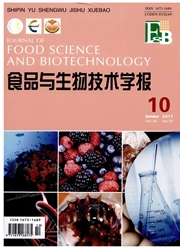

 中文摘要:
中文摘要:
维生素C是一种重要的有机酸,广泛应用于药物、食品、饮料、化妆品和饲料等中。相对于“莱氏法”而言,生物技术法生产维生素C具有低成本、高品质等优势,其主要包括一步发酵工艺和二步发酵工艺,而后者又包括以葡萄糖为底物的串联工艺和以D-山梨醇为底物的工艺。在对比各种生产方法的基础上,鉴于以D-山梨醇为底物的发酵工艺是唯一用于工业生产的生产方法,重点介绍了发酵法生产维生素C在发酵条件优化和一步发酵工程菌株的构建等方面的研究进展,并给出了生物技术法将来可能的发展方向。
 英文摘要:
英文摘要:
Vitamin C, an important organic acid, is widely used in the industries of pharmaceuticals, cosmetics, food, beverage and feed additives, etc. Compared with the Reichstein method, biotechnological production of vitamin C is an abstr'active approach due to the low cost but high product quality. In this manuscript, biosynthesis of vitamin C, including onestep fermentation and two-step fermentation, were firstly discussed and compared. Considering the industrial production of vitamin C through the oxidation of D-sorbitol or L-sorbose to 2-keto- L-gulonic acid is the only and efficient method, we then focused on the progress of the fermentation condition optimization and one-step fermentation strains construction. Furthermore, the prospects of the biotechnological production vitamin C were also presented.
 同期刊论文项目
同期刊论文项目
 同项目期刊论文
同项目期刊论文
 Delayed supplementation of glycine enhances extracellular secretion of the recombinant alpha-cyclode
Delayed supplementation of glycine enhances extracellular secretion of the recombinant alpha-cyclode Application of a novel cavern volume controlled culture model to microbial hyaluronic acid productio
Application of a novel cavern volume controlled culture model to microbial hyaluronic acid productio Characterization of Thermobifida fusca Cutinase-Carbohydrate-Binding Module Fusion Proteins and Thei
Characterization of Thermobifida fusca Cutinase-Carbohydrate-Binding Module Fusion Proteins and Thei Improved production of polygalacturonate lyase by combining a pH and online methanol control strateg
Improved production of polygalacturonate lyase by combining a pH and online methanol control strateg Heterologous Expression and Biochemical Characterization of alpha-Glucosidase from Aspergillus niger
Heterologous Expression and Biochemical Characterization of alpha-Glucosidase from Aspergillus niger Modeling and optimization of cutinase production by recombinant Escherichia coli based on statistica
Modeling and optimization of cutinase production by recombinant Escherichia coli based on statistica Enhanced production of poly(vinyl alcohol)-degrading enzymes by mixed microbial culture using 1,4-bu
Enhanced production of poly(vinyl alcohol)-degrading enzymes by mixed microbial culture using 1,4-bu Combined dissolved oxygen and pH control strategy to improve the fermentative production of l-isoleu
Combined dissolved oxygen and pH control strategy to improve the fermentative production of l-isoleu Typical methanogenic inhibitors can considerably alter bacterial populations and affect the interact
Typical methanogenic inhibitors can considerably alter bacterial populations and affect the interact Enhancement of cell viability and alkaline polygalacturonate lyase production by sorbitol co-feeding
Enhancement of cell viability and alkaline polygalacturonate lyase production by sorbitol co-feeding Use of Escherichia coli add/ade mutant and Saccharomyces cerevisiae WSH2 to construct a highly effic
Use of Escherichia coli add/ade mutant and Saccharomyces cerevisiae WSH2 to construct a highly effic Enhanced secretion of recombinant alpha-cyclodextrin glucosyltransferase from E. coli by medium addi
Enhanced secretion of recombinant alpha-cyclodextrin glucosyltransferase from E. coli by medium addi Enhancement of pyruvate productivity by inducible expression of a F0F1-ATPase inhibitor INH1 in Toru
Enhancement of pyruvate productivity by inducible expression of a F0F1-ATPase inhibitor INH1 in Toru Modeling and Optimization of Microbial Hyaluronic Acid Production by Streptococcus zooepidemicus Usi
Modeling and Optimization of Microbial Hyaluronic Acid Production by Streptococcus zooepidemicus Usi Enhancement of glutathione production in a coupled system of adenosine deaminase-deficient recombina
Enhancement of glutathione production in a coupled system of adenosine deaminase-deficient recombina Enhancement of Hyaluronic Acid Production by Batch Culture of Streptococcus zooepidemicus via the ad
Enhancement of Hyaluronic Acid Production by Batch Culture of Streptococcus zooepidemicus via the ad Comparative study on the influence of dissolved oxygen control approaches on the microbial hyaluroni
Comparative study on the influence of dissolved oxygen control approaches on the microbial hyaluroni Calcium Leads to Further Increase in Glycine-Enhanced Extracellular Secretion of Recombinant alpha-C
Calcium Leads to Further Increase in Glycine-Enhanced Extracellular Secretion of Recombinant alpha-C Mutations at subsite-3 in cyclodextrin glycosyltransferase from Paenibacillus macerans enhancing alp
Mutations at subsite-3 in cyclodextrin glycosyltransferase from Paenibacillus macerans enhancing alp Lowering induction temperature for enhanced production of polygalacturonate lyase in recombinant Pic
Lowering induction temperature for enhanced production of polygalacturonate lyase in recombinant Pic Enhanced Hyaluronic Acid Production of Streptococcus zooepidemicus by Shifting Dissolved Oxygen Leve
Enhanced Hyaluronic Acid Production of Streptococcus zooepidemicus by Shifting Dissolved Oxygen Leve Microbial production of low molecular weight hyaluronic acid by adding hydrogen peroxide and ascorba
Microbial production of low molecular weight hyaluronic acid by adding hydrogen peroxide and ascorba A newly isolated Paecilomyces sp WSH-L07 for laccase production: isolation, identification, and prod
A newly isolated Paecilomyces sp WSH-L07 for laccase production: isolation, identification, and prod Culture conditions optimization of hyaluronic acid production by Streptococcus zooepidemicus based o
Culture conditions optimization of hyaluronic acid production by Streptococcus zooepidemicus based o Enhanced cutinase production of Thermobifida fusca by a two-stage batch and fed-batch cultivation st
Enhanced cutinase production of Thermobifida fusca by a two-stage batch and fed-batch cultivation st Enhanced hyaluronic acid production of Streptococcus zooepidemicus by an intermittent alkaline-stres
Enhanced hyaluronic acid production of Streptococcus zooepidemicus by an intermittent alkaline-stres Influence of hyaluronidase addition on the production of hyaluronic acid by batch culture of Strepto
Influence of hyaluronidase addition on the production of hyaluronic acid by batch culture of Strepto 期刊信息
期刊信息
